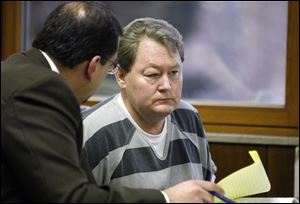
Father's conviction overturned
7/30/2011
Charles Fackelman was found guilty in 2007 for confronting the man responsible for his son’s death and pulling a gun on him.
The Michigan Supreme Court has overturned the conviction of Charles Fackelman, the Toledo man who pulled a loaded handgun on the man responsible for his teenage son Charlie Fackelman’s road-rage death.
In a 5-2 decision, the state’s high court found Thursday that repeated references to a psychological diagnosis that was never entered into evidence — and that was written by a psychiatrist who never testified at Mr. Fackelman’s trial — violated his constitutional right to confront witnesses against him.
Mr. Fackelman has been serving a 5 3/4 to 20-year sentence in a Jackson, Mich., prison since a jury found him guilty of home invasion, gun possession, and two counts of felonious assault in January, 2008.
Mr. Fackelman confronted Randy Krell of Lambertville with a loaded gun in March, 2007. Mr. Krell ran to a neighbor’s home, where Fackelman kicked in the door and pointed the gun at the men.
The attack took place nine months after Mr. Krell, a former Bedford Public Schools board member, chased a carload of teenagers, one of whom had thrown a bottle of water at his vehicle. The high-speed chase ended when the teens’ car ran through an intersection in Whiteford Township and hit a tree. Mr.Fackelman’s 17-year-old son, Charlie, a passenger in the car, was killed and another teen was paralyzed. Mr. Krell was later convicted of negligent homicide, a misdemeanor, and sentenced to six months in jail.
During his trial, Mr. Fackelman claimed he couldn’t remember the attack on Mr. Krell, which occurred the day after he watched his son’s school baseball team play what would have been the teen’s first varsity game as shortstop. Witnesses described Mr. Fackelman as depressed and uncommunicative at the time. His attorney sought a verdict of not guilty by reason of insanity.
Two psychiatrists testified at the trial. The prosecution’s psychiatrist found Mr. Fackelman mentally ill but not legally insane, while the defense’s psychiatrist found he was legally insane.
A third psychiatrist also evaluated Mr. Fackelman. Dr. Agha Shahid saw him at Flower Hospital’s psychiatric intensive care unit two days after the attack. Dr. Shahid was not called to testify, but his diagnosis of “major depression, single episode, severe without psychosis,” was referenced several times by the other two experts and the prosecution.
In its majority opinion, the court wrote, “We conclude that the use of this powerful, tiebreaking diagnosis as substantive evidence of defendant’s sanity compromised his constitutional right to be confronted with the witness against him.”
Chief Justice Robert P. Young, Jr., one of two dissenting justices, argued in his own opinion that Mr. Fackelman’s attorney didn’t call Dr. Shahid because his evaluation would have undermined the insanity defense. “On appeal, defendant now attempts to transform this conscious trial strategy into an ‘appellate parachute,’” Justice Young wrote. “Although our jurisprudence abhors sanctioning such appellate parachutes, the majority here blesses this artful appellate strategy. I cannot.”
The Supreme Court’s decision will return the case to the Monroe County Circuit Court, John Minock, Mr. Fackelman’s attorney, said. He said a bond hearing is tentatively set for Friday at 8:30 a.m. before Judge Joseph Costello, Jr.
“He is greatly relieved,” Mr. Minock said about his client, who has been in prison three years and five months.
Kenneth Simon, the assistant prosecuting attorney from Wayne County who tried the case, said his office plans to appeal.
Contact Tony Cook at: tcook@theblade.com or 419-724-6065